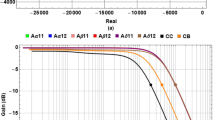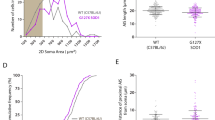Abstract
Demyelination of peripheral axons initially causes failure of action potential conduction, probably because the internodal membrane lacks sodium channels1,2. However, Bostock and Sears3 showed that 3–14 days after demyelination of rat nerve with diphtheria toxin, some axons develop regenerative inward currents in the internodal membrane permitting continuous (non-saltatory) conduction. In nerves that have remyelinated or regenerated, the number of nodes per unit length of fibre characteristically increases greatly4,5. As the internodal membrane does not normally possess sodium channels1,2, both the earlier appearance of continuous conduction in the demyelinated nerve and the later presence of extra nodes in the remyelinated nerve require either a laying down of new sodium channels or a redistribution of the sodium channels in the original nodes. The present experiments examine the changes in the total number of sodium channels, measured by saxitoxin-binding capacity1, that occur in rabbit sciatic nerves which have been demyelinated in vivo with lysolecithin2,5 and then allowed to remyelinate. The results provide no evidence for the formation of new sodium channels during the early stage, when continuous conduction may develop, but show clearly that new channels are formed during remyelination.
This is a preview of subscription content, access via your institution
Access options
Subscribe to this journal
Receive 51 print issues and online access
$199.00 per year
only $3.90 per issue
Buy this article
- Purchase on Springer Link
- Instant access to full article PDF
Prices may be subject to local taxes which are calculated during checkout
Similar content being viewed by others
References
Ritchie, J. M. & Rogart, R. B. Proc. natn. Acad. Sci. U.S.A. 74, 211–215 (1977); Rev. Physiol. Biochem. Pharmac. 79, 1–50 (1977).
Chiu, S. Y. & Ritchie, J. M. Nature 284, 170–171 (1980).
Bostock, H. & Sears, T. A. J. Physiol., Lond. 280, 273–301 (1978).
Cragg, B. G. & Thomas, P. K. J. Physiol., Lond. 171, 164–175 (1964).
Hall, S. M. & Gregson, N. A. J. Cell Sci. 9, 769–789 (1971).
Jacobs, J. M. & Cavanagh, J. B. J. Anat. 105, 295–306 (1969).
Sherratt, R. M., Bostock, H. & Sears, T. A. Nature 283, 570–572 (1980).
Chiu, S. Y., Ritchie, J. M., Rogart, R. B. & Stagg, D. J. Physiol., Lond. 292, 149–166 (1979).
Horackova, M., Nonner, W. & Stämpfli, R. Proc. int. Un. Physiol. Sci. 7, 198 (1968).
Blakemore, W. F., Eames, R. A., Smith, K. J. & McDonald, W. I. J. neurol. Sci. 33, 31–43 (1977).
Smith, K. J. & Hall, S. M. J. neurol. Sci. 48, 201–219 (1980).
Hall, S. M. & Gregson, N. A. J. Cell Sci. 9, 769–789 (1981).
Author information
Authors and Affiliations
Rights and permissions
About this article
Cite this article
Ritchie, J., Rang, H. & Pellegrino, R. Sodium and potassium channels in demyelinated and remyelinated mammalian nerve. Nature 294, 257–259 (1981). https://doi.org/10.1038/294257a0
Received:
Accepted:
Issue Date:
DOI: https://doi.org/10.1038/294257a0
This article is cited by
-
Structure-activity relationship studies of four novel 4-aminopyridine K+ channel blockers
Scientific Reports (2020)
-
Linking demyelination to compound action potential dispersion with a spike-diffuse-spike approach
The Journal of Mathematical Neuroscience (2019)
-
Development of a PET radioligand for potassium channels to image CNS demyelination
Scientific Reports (2018)
-
Detection of sodium channel distribution in rat sciatic nerve following lysophosphatidylcholine-induced demyelination
The Journal of Membrane Biology (1986)
-
Loosening of paranodal myelin by repetitive propagation of action potentials
Nature (1983)
Comments
By submitting a comment you agree to abide by our Terms and Community Guidelines. If you find something abusive or that does not comply with our terms or guidelines please flag it as inappropriate.



